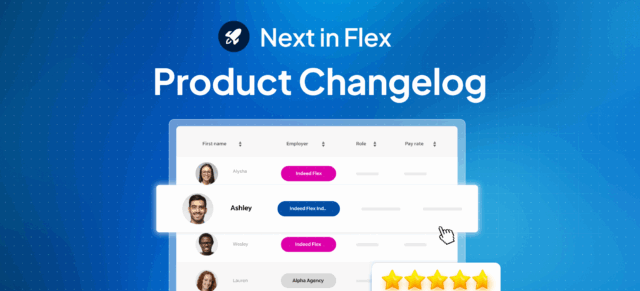
Managing debt as a temporary worker is crucial for staying financially healthy and avoiding long-term financial stress – and just better for your all-round mental and physical wellbeing.
When it comes to debt management, it’s important among many other things, to consider just what debt management is, which we’ll cover in this post.
Specifically, we’ll look at how to reduce debt, where to go for debt management advice, common sources of debt, the importance of budgeting (and how to do it), prioritising debts, and the importance of your credit score and how to improve it.
By the end of this post, you should have a greater understanding of how to effectively manage your finances, reduce debt, and build a more secure financial future.
Understanding debt management
The first step in managing debt is to gain a clear understanding of your financial situation, and any changes you might need to make.
Temporary work can sometimes result in a variable income, with seasonal peaks and troughs (depending on which industry you work in), making it even more important to have a solid financial foundation.
The definition of debt management
You may well be asking yourself, just what is debt management? So before going any further, let’s look to define it clearly.
Debt management is a strategic and thoughtful approach to handling your financial obligations, particularly outstanding debts, in a way that is both effective and sustainable in the long term.
It involves making a series of financial decisions aimed at reducing your debt and, ultimately, getting rid of it altogether.
Debt management often begins with a careful examination of all debts, the interest rates attached to them, and the minimum monthly payments you need to make in order to maintain financial stability.
Armed with the right information, you can create a structured plan for managing these debts, and ease your financial worries.
This plan may involve prioritising high-interest debts for quicker repayment, exploring debt consolidation options to simplify the repayment process, negotiating with creditors to secure more favourable repayment terms, or seeking professional advice on the matter.
The overall goal when it comes to debt management, is to regain financial stability, do away with the day-to-day burden of debt, and work towards a debt-free future while maintaining a manageable budget that allows you to enjoy life.
Budgeting and financial planning for temporary workers
 Creating a budget will give you a clearer picture of where your money is going and help you to identify areas where you can make cost-effective choices. It’s an essential part of any debt-management plan.
Creating a budget will give you a clearer picture of where your money is going and help you to identify areas where you can make cost-effective choices. It’s an essential part of any debt-management plan.
But… it requires careful planning and dedication, so here’s some more information on why you should consider creating a budget and the best way to go about it.
The importance of budgeting
Budgeting is of paramount importance when it comes to dealing with debt, providing the basic framework for managing personal finances and achieving your financial goals.
In a country where the cost of living can vary significantly, depending on where you live, budgeting allows you to control your spending, save for emergencies, and plan for major expenses like home ownership, loans, or retirement.
It helps you to gain a better understanding of your monthly income and expenses, covering anything and everything, from rent/mortgage repayments to energy bills, to groceries, to transport costs, and more besides.
It’s an invaluable tool when it comes to building a secure financial future, achieving your financial (and other) goals, and dealing with economic uncertainties, making it an essential skill for financial wellbeing.
Steps for creating an effective budget
As outlined earlier on in this post, creating a budget requires a degree of effort, but it’s worth it in the long run, when it comes to how to manage debt.
It’s a step-by-step process that can be broken down into smaller, more manageable tasks, rather than looking to tackle it head on.
- Gather financial information: Collect all your financial documents, including bank statements, payslips, bills, and any other financial records which you feel are relevant.
- Calculate your monthly income: next, work out – on a monthly basis – how much you usually have coming in, including your wages, freelance or part-time earnings, and any other sources of income. Now you can get going with your budget.
- List your expenses: make a list of all your monthly expenses – literally everything. This includes fixed expenses like rent or mortgage, energy bills, insurance policies, food, transport costs, entertainment, and any loan payments.
- Categorise these expenses: group your expenses into categories, such as housing, transport, groceries, healthcare, policies (insurance and such), and entertainment. This will help you to see where your money is going.
- Distinguish between ‘needs’ and ‘wants’: Differentiate between essential needs and optional spending i.e that which you don’t actually have to spend money on, but would like. Essentials, like rent and groceries, are non-negotiable, while optional spending includes things like dining out or entertainment.
- Create a budget spreadsheet or use budgeting apps: Use a spreadsheet (using software such as Microsoft Excel or Google Sheets) or a budgeting app, such as Mint, to organise your income and expenses. There are also various tools available online, for free.
- Allocate funds based on your spreadsheet: allocate a specific amount to each expense category you created, based on your income and priorities. Ensure that your total expenses do not exceed your total income.
- Track your spending: keep an eye on your spending throughout the month, by holding onto your receipts and recording your expenses, to ensure you stay on track.
- Build an emergency fund: ideally, you should look to build an emergency fund, aiming for three to six months’ worth of living expenses – which will give you some breathing space if, for example, you can’t find a suitable job for a while.
- Save and invest: if you have enough set aside, at the end of each month, consider saving for long-term goals, such as retirement or home refurbishments, and explore investment opportunities to make your money work for you. If you’re unsure what’s available to you in terms of investments, seek advice from a financial professional.
- Review your budget periodically: revisit your budget on a regular basis, ideally, each month, to ensure you’re staying on track with your financial goals and to make any necessary adjustments – you may well find yourself in a better position than you first thought.
By following these steps and committing to a well-structured budget, you can take control of your finances, reduce financial stress, and move on to the next step, which is…
Assessing Your Debt Situation

Taking stock of your debts
Start off by creating a comprehensive list of personal debts, as the first vital step towards effective debt management. To create this list, gather all your financial documents, including loan agreements, credit card statements, hire purchase agreements, and any other debt-related paperwork. Next, note down each debt separately, specifying the type of debt (e.g. credit card, personal loan, mortgage, car repayments), the outstanding balance, the interest rate, and the terms of repayment. Pay close attention to the interest rates, as these significantly impact the cost of the debt over time. Make a note of the minimum monthly payments and the due dates for these.
By having this detailed overview of your debts, you can prioritise high-interest debts for quicker repayment, negotiate with creditors if necessary, and create a structured debt repayment plan tailored to your individual financial situation (we’ll cover this in more detail further down this post).
Understanding Credit Scores and Reports
Credit scores hold significant importance for temporary workers when considering how to manage debt. These scores, based on your individual credit history and financial behaviour, play a crucial role in relation to personal finance. For temporary workers, maintaining a good credit score is essential for several reasons. Firstly, it affects your ability to secure loans, credit cards, or mortgages, which may be necessary for major life events, such as buying a home or home, maybe starting your own business. Secondly, a positive credit score can lead to more favourable terms on loans and credit, saving you a significant amount of money on interest payments.
In addition to this, landlords and potential employers often review credit scores as part of their screening processes, so a good credit rating can improve rental and job prospects. By managing your finances responsibly and keeping a good credit score, you’ll be able to access better financial opportunities, giving you more breathing room when it comes to making financial decisions.
How to access and review credit reports for accuracy
Accessing and reviewing your credit report for accuracy is an essential financial practice if you’re looking at how to manage debt effectively. You can get your credit report from any of the major credit reference agencies, such as Experian, Equifax, or Clearscore. Under the General Data Protection Regulation (GDPR), you’re entitled to a free copy of your credit report, so it’s well worth doing as it important in assessing your financial situation and won’t cost you a penny. You also need to check your credit report to see if there are inaccuracies, so you can look to correct them. Review all of the information carefully, including your personal details, account history, and credit applications. If you do find any errors, report them to the credit reference agency you got the report from, who will be obliged to investigate and correct anything that’s wrong.
Ensuring the accuracy of your credit report is crucial because lenders and financial institutions rely on this information when considering whether to offer you credit or not, and errors could affect your ability to secure loans or other financial services.
Strategies to improve your credit score over time
Improving your credit score over time should definitely be one of your financial goals when looking at debt solutions. Doing so, can then open doors to better financial opportunities. Here are a few strategies to help you boost your credit score…
- Pay bills on time: Consistently paying your bills, including credit card balances, loans, a mortgage, car repayments, and energy bills on time is one of the most critical factors when it comes to improving your good credit score.
- Reduce credit card balances: Aim to keep your credit card balances low. High credit card balances can negatively impact your score. Reducing these balances demonstrates responsible credit management.
- Use credit wisely: Avoid opening too many new credit accounts in a short period of time, as it can be seen as a sign of financial instability. Use credit responsibly and only when necessary.
- Use a ‘soft search’ for credit applications: When shopping for credit or loans, use lenders that offer a ‘soft search’ first, as these searches won’t impact your credit score.
- Don’t close old accounts: Closing old accounts can shorten your credit history and potentially lower your score, so it’s worth keeping them open to maintain a positive credit history.
- Register on the electoral roll: Make sure you’re registered to vote at your current address, with your local authority. This helps to confirm your identity and can positively impact your credit score.
- Settle defaults: If you have any defaults on your credit report, work to pay them off. Once they’re settled, they should be marked as ‘satisfied’, which is more positive than an outstanding default.
- Be patient, as credit improvement takes time: Positive changes in your credit behaviour, such as consistently paying bills on time and reducing credit card balances, will gradually lead to an improved credit score. It won’t happen overnight, but it will over a number of months, so be patient.
Debt Reduction Strategies
Once you have a greater understanding of debt management and just what that means, and once you’ve created a monthly budgeting plan and assessed your debt situation, there are a few strategies you can actively use to reduce debt.
- Prioritise high-interest debt: High-interest debts, such as credit card balances, can be a particular financial worry. Focus on paying off these high-interest debts first. By tackling the debts early, you’ll reduce the amount you pay in interest over time, freeing up more of your income for other financial goals.
- Explore debt consolidation: Debt consolidation involves combining multiple debts into just one, lower-interest loan. This can make managing debt more straightforward and reduce your monthly payments. There are various consolidation options, including personal loans and balance transfer credit cards, which may be suitable depending on your circumstances.
- Negotiate with creditors: If you’re struggling with payments or facing financial hardship, don’t hesitate to contact your creditors. They may be willing to negotiate lower interest rates, extended repayment terms, or more manageable monthly payment plans. It’s in their best interest to work with you to ensure can meet repayments.
- Create a debt repayment plan: Develop a structured debt repayment plan, by listing your debts in order of priority and set specific, realistic goals for paying them off. You can choose what’s commonly known as the ‘snowball method’ (starting with the smallest debt and working your way up) or the ‘avalanche method’ (tackling high-interest debts first).
- Sell unnecessary assets: This may seem fairly obvious, but in looking at a debt management plan, consider selling items you no longer need or use, such as electronic devices, clothing, or furniture, to generate extra cash to put towards your debts.
- Invest in financial education: Knowledge is power, as they say, so take the time to learn about personal finance and money management. Many free resources are available online, including courses, books, and blogs, such as this one, that cover topics such as budgeting, saving, pensions, investing, and debt management.
- Seek professional advice: If you’re overwhelmed by debt and struggling to manage your finances, consider speaking to a financial adviser or credit counsellor. These professionals can help you develop a debt management plan tailored to your unique financial situation. They can also provide guidance on budgeting, savings strategies, and long-term financial planning.
At Indeed Flex, we provide a free, 24/7 financial advice support line when you qualify for our Flexer Benefits. By applying the strategies mentioned above, you can look to ease your financial worries and manage debt in a way that’s sustainable and still allows you to live your life.
Overview: How to manage debt as a temporary worker
Temporary work can be a stepping stone to a more stable and rewarding career. However, it can, at times, present financial challenges.
So, effective debt management, budgeting, and financial planning can help you deal with these challenges and build a brighter financial future for both yourself and your loved ones.
By understanding just what debt management is and what it involves, creating a well-planned monthly budget, gaining an understanding of credit reports and scores, and applying debt reduction strategies, you can ease your financial concerns – contributing to your overall wellbeing.
Remember that debt management is an ongoing process. By following the advice in this post and staying committed to your financial goals, you can achieve financial stability, reduce debt, and work towards a secure and prosperous future, ultimately giving you greater peace of mind.








